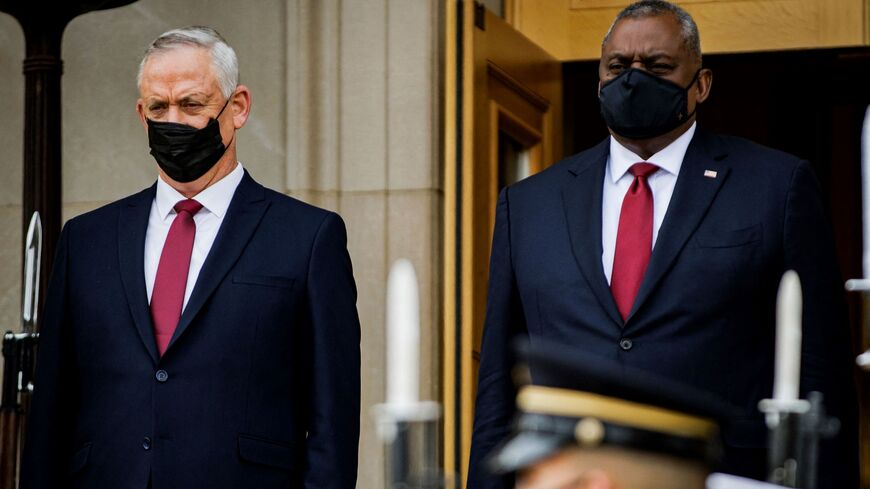
Israeli Defense Minister Benny Gantz and US Secretary of Defense Lloyd Austin met at the Pentagon to discuss Iran’s nuclear program, and the possibility of a military response if negotiations continue to stall.
Israel’s defense chief Benny Gantz sat down with US counterpart Lloyd Austin at the Pentagon to discuss a range of issues on Thursday, including shared concerns over Iran’s advancing nuclear program.
Austin said ahead of today’s closed-door meeting that he was deeply concerned about what he called Iran’s lack of constructive engagement at the ongoing negotiations in Vienna. He also affirmed that the Biden administration is “prepared to turn to other options” to halt Tehran’s nuclear program if diplomatic talks fail to do so.
The Israeli defense chief said he wants to deepen dialogue with the US on the subject, including on “joint military readiness to face Iran and to stop its regional aggression and nuclear aspirations.”
Gantz’s office later said the pair held a “meaningful discussion … with a particular focus on the developing challenge vis-à-vis the Iranian nuclear program and its regional aggression.” He later met with Secretary of State Antony Blinken.
Why it Matters: The Biden administration is ratcheting up the pressure on Iranian negotiators in hope of breaking the diplomatic stalemate after last week’s talks in Vienna went nowhere.
Talks resumed earlier today as Gantz and Mossad chief David Barnea arrived in Washington to coordinate on the issue.
Israeli sabotage attacks on Iran’s nuclear program have failed to stop Tehran’s uranium enrichment, and officials have reportedly pressed their American counterparts to devise a plan B should negotiations with the Raisi government falter.
The White House publicly confirmed on Thursday that President Joe Biden had done just that, ordering his administration to make alternative preparations to halt Iran’s nuclear program.
“We are completely aligned in our commitment to preventing Iran from obtaining a nuclear weapon,” Austin said today.
Tehran insists its nuclear enrichment is for peaceful purposes, but US and Israeli officials aren’t taking their word for it. Iran already possesses the region’s largest array of ballistic missiles, and Prime Minister Neftali Bennett’s government is treating the issue as a potential existential threat.
“The nuclear program is a means to their hegemonic goals,” Gantz said Thursday.
Reuters reported last night that Gantz and Austin were set to discuss joint military exercises that would help prepare for a potential future strike, and that Austin had briefed national security adviser Jake Sullivan on US military options back in October. Speaking to reporters today, Pentagon Press Secretary John Kirby declined to either deny or confirm the report.
“We routinely conduct exercises and training with our Israeli counterparts,” Kirby said.
Gantz’s visit follows a trip by two senior IDF officials to CENTCOM headquarters in Tampa, where they “discussed operational cooperation in the region, discussed shared challenges facing the two militaries and deepened their operational preparedness.”
What They’re Saying: Israel has carried out successful airstrikes on two of its neighbors’ nuclear sites before, one in Iraq in 1981 and another in Syria in 2007.
But experts say the IAF’s warplanes do not have the range to carry out an extended strike campaign into Iran, some of whose nuclear facilities are underground. Israel needs US support for such a strike.
“There is no viable Israeli military option,” Alon Pinkas, former foreign policy adviser to Prime Minister Ehud Barak and to four Israeli foreign ministers, said during an online event last week. “Anyone talking about it is either talking out of bravado or perhaps to convince American officials.”
The Biden administration likely isn’t aiming to conduct such an operation anytime soon, but the tough talk out of Washington suggests that current administration officials – who have tended to be cautious in public – feel they may be running out of options in Vienna.
What’s Next: Indirect negotiations kicked off again today, but this round won’t last long if Iranian officials don’t approach the talks seriously, US officials are warning.
Know More: Ali Hashem sheds light on the the UAE national security adviser’s latest trip to Tehran amid of the current round of talks.
